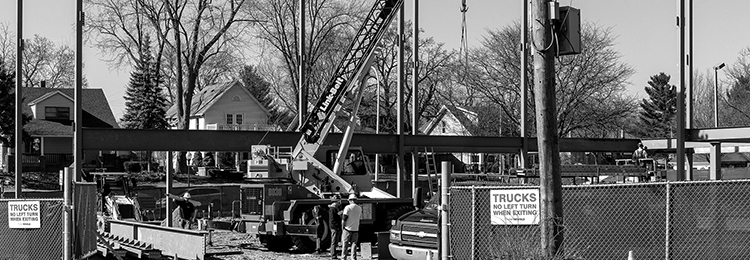In the years since the Great Recession, the construction industry has experienced a shortage of skilled workers seeking employment. Some of the industry’s most experienced workers were forced to either establish careers in other industries or relocate to other countries during the economic downturn. So, in these better times, how do you find the best people to hire as new employees? How do you rebuild your workforce in a thoughtful and educated way?
In part two of this series, industry experts at Builders Mutual offer tips to keep in mind when initiating the hiring process.
Day laborers vs. construction workers
There are two types of new hires a contractor can employ: day laborers and construction workers. While day laborers are seeking work for that day, construction workers have been properly trained in the practices of the construction industry and are hired through normal hiring practices.
Contractors hire day laborers over construction workers for many reasons, including to lower labor costs, replace sick crew members, finish small detail work, or clean up construction sites. Hiring day laborers can have its benefits, but it also has its drawbacks. For example, the work done by day laborers is not always consistent. Picking up people in a parking lot is not the safest way to find reliable employees or the most effective way to manage risk on your job-sites.
Regardless, the labor shortage is forcing contractors to find new means of obtaining employees. The result? Builders are increasingly turning to day-labor-hiring websites and temp agencies in order to acquire dependable workers.
Recruiting is key
One way to find new employees is through recruiting. The best way to recruit varies by worker. While the recruitment of day laborers is as simple as driving to a meeting spot and making a selection from the group that is gathered, beware the disadvantages of this option. For construction workers, however, recruiting requires a bit more effort.
You can find individuals who hold an interest in the construction industry by traveling to vocational schools, construction schools, and community colleges that offer courses in plumbing, electric, or carpentry.
“With lots of training and programming available, there is a tremendous career opportunity for young people entering the construction industry,” says Mike Gerber, senior vice president and chief marketing officer at Builders Mutual. “Showcase your company, as well as this career potential, to students through events like job fairs. It would be beneficial to offer apprenticeships as well. These provide another way of establishing relationships with potential employees.”
As mentioned in the first article in this series, you can also recruit among competitors. Keep an eye out for quality work done near you – and ensure your own workers feel like valued members of your team to avoid losing anyone to a better offer.
Veterans who have recently left the military are also good recruits for your company. They are often dependable and known for bringing a good work ethic to the job-site. The Home Builders Institute is heavily involved in military retraining programs that encourage a shift to the construction industry after retirement from service.
Additionally, you can use reputable hiring and staffing firms to fill particular jobs. You should provide proper job descriptions that tell workers exactly what the role will entail and what training and skills are required.
Qualities of a good hire
Michele Hemric, assistant vice president of human resources and organizational effectiveness at Builders Mutual, puts the goal simply: “You want to hire workers who you can depend on to come back after lunch.” A good hire is hardworking, reliable, capable, and dedicated to getting the job done right.
There are ways to ensure new hires possess such qualities. Michele suggests five questions you should ask to determine whether a potential hire would be a good fit for your job-site:
- What experiences or skills do you have that relate to this job?
- Can you perform any or all of the job functions “with or without reasonable accommodation”?
- Are you authorized to work in the United States?
- Are you able to work with our required schedule? Can you work overtime?
- Do you have reliable transportation to get here?
- Can you comply with safety requirements?
To help contractors confirm that workers have experience and can perform job functions, Builders Mutual developed a partnership with the WorkSTEPS program. This program is designed to produce individualized, objective, scientific data about the worker being tested. This data is then used to place that individual with a specific job based on their functional capabilities, ultimately creating a safer and more productive job-site.
Vetting potential hires
Whether you hire day laborers or workers who will offer services for a much longer period of time, you need to understand who you will be trusting around your job-site and other employees. In order to make sure you hire a reliable and dependable individual, you should go through a formal hiring process and find out each applicant’s experience and qualifications. This means having each potential employee fill out an application. The information acquired, such as emergency contacts and addresses, also could be important in case an accident were to occur.
In addition to requiring an application, you should conduct background checks. Builders Mutual’s partnership with IntelliCorp helps by providing discounts on background checks and employment screening products so that you are able to attain the most comprehensive data on your applicants.
To finish the hiring process, you should have employees complete and sign new-hire paperwork such as the I-9, federal, and state tax forms, and even have them comply with post-offer drug testing. When available, references can also help you avoid the costs of a poor hire.
Next: Training and Onboarding
Builders Mutual is here to help contractors with job-site safety and risk management, making new-hire training less of a challenge. By using the many resources Builders Mutual offers, and investing time into the recruitment and education of new hires, you will help your business successfully navigate the labor shortage.




 Find an
Find an